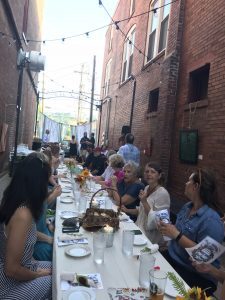Robyn Ryle's Blog
March 27, 2022
Baseball and inequality
Hey, go subscribe to my newsletter to get these posts delivered into your inbox, every Monday morning! Check it out here.
People are willing to give up a lot in order to make sure others don’t get more. That’s what experimental economist Daniel Zizzo found in a 2001 experiment. He gave some volunteers more money and some less. He found that volunteers were willing to spend their own money if it reduced the amount of money others had.
Zizzo called it burning other people’s money. A surprising number of people were willing to reduce their own wealth if it would also reduce the wealth of other people, a phenomenon that isn’t economically rational, but is explained psychologically by our sense of how “deserving” we believe others to be. The study helps us understand why specific policies to reduce inequality in the United States are often so unpopular—we tend to believe everyone is less deserving than ourselves.
It might also explain what’s happening with my Reds, where owner Bob Castellini was among four owners during the recent collective bargaining agreement negotiations to vote no on what at the time was the “best and final offer” from the players. With that ‘no’ vote, Castellini and the other owners showed they were more than willing to burn their own money in the form of lost games to prevent the “undeserving” players making significant gains from what is a $10.7 billion dollar business.
Once the players’ association and the league did reach an agreement—one that did not include many of the demands the player started with—Castellini showed just how he felt about the small gains players did achieve by commencing what in baseball we call a ‘fire sale,’ or in this case, petty revenge.
The Reds traded starting pitcher Sonny Gray. Then the charismatic third basemen Eugenio Suarez and All-Star outfielder Jess Winker. Next the fiery and outspoken relief pitcher Amir Garrett. Finally, Nick Castellanos departed for the Phillies, leaving aging first basemen Joey Votto as perhaps the loneliest man in baseball.
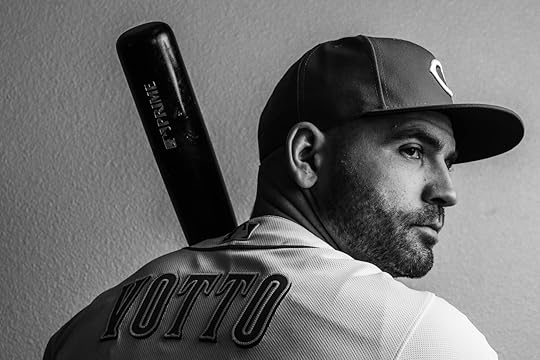 Joey’s Canadian, so he hates capitalism, too.
Joey’s Canadian, so he hates capitalism, too.Why should you care about any of this if you’re not a Reds’ fan? Because baseball provides an interesting microcosm for inequality in society at large and a good refresher on exactly how capitalism works (SPOILER: Also, why capitalism sucks.)
The owners are, of course, the bourgeois. They own the means of production and they’re motivated by the desire to keep as much of the profit for themselves as possible. I know it sounds strange to call the players the proletariat, but by Marx’s definition, they are. They’re selling their labor in order to live.1 What the players association wants is a fairer share of the $1 billion in growth the league has experienced between 2015 and 2019, a period in which players’ salaries declined. In other words, they want an equitable distribution of profits, something more in line with the standard 50/50 split in other leagues like the NFL and the NBA.
The players aren’t arguing that they should make the same amount of money as the owners. They’re not socialists. They weren’t arguing for a radical overhaul of the status quo, even though that status quo is responsible for the currently skewed distribution. All they want is a slightly larger piece of a very big pie.
“But Mike Trout got a $426.5 million contract!” you might be yelling at me right now, which is true. It’s also exactly what the owners and the CEOs and the other capitalists want you to think.2 Sure, get mad at Mike Trout. Forget about the fact that Arte Moreno as an owner makes enough money to pay Mike Trough $426.5 million dollars along with the salary of the other 25 players on his team. To paraphrase Chris Rock, Mike Trout is rich. Arte Moreno is wealthy. There’ a big difference between the two. Either way, you need to ask yourself why you’re mad about Mike Trout or Patrick Mahomes or Steph Curry but not about the dudes (it’s always dudes) who pay them.
The players want a more even distribution of profits. This is something all of us should want. It’s not a radical idea. And yet, we live in a country where the average CEO earns 351 times what his average worker makes.
A slightly larger piece of the pie is what Americans in general say they want. Baseball is a microcosm of a central contradiction at the core of inequality in the U.S. Though the majority of Americans, across party lines, favor a more equitable distribution of income and wealth in the abstract—a distribution that resembles countries like Sweden— they’re unlikely to support the concrete changes that would get us there. The psychology of inequality—being willing to punish ourselves to prevent anyone else from benefitting—gets in the way.
Another psychological concept, upward comparison bias, might help explain this reluctance. We tend to compare ourselves to those who are doing better than us, rather than to those who are doing worse. Maybe MLB owners are looking at their even wealthier corporate counterparts and feeling deprived. Certainly, the owner of any given team isn’t making 351 times what his average player is. If Jeff Bezos can get away with it, why not Arte Moreno?
The players association, on the other hand, shows us what it might take to break this mental logjam in our thinking about inequality. Their union is famous for its culture of collective thinking. In addition to wanting a more equal distribution of revenue, the players other demand is to end ‘tanking,’ the practice of deliberately depressing payroll in a way that sacrifices a team’s ability to compete. They want to play in a league in which the people in charge actually want to win games, instead of just generating revenue—another radical concept. They want to make it less possible for owners to do what Bob Castellini is currently doing to the Reds, reducing salary and giving fans a team that is almost guaranteed to finish last in their division. Exciting, yeah?
Let me put if more plainly—the players want baseball to be good. The owners just want to make money. Period. End of story.
You’d think we’d have figured this out by now, but this is how capitalism works. The free market and competition are supposed to make for a better world if you believe Adam Smith.3 Yeah, how did that work out for us during the pandemic, when we realized our hospitals are built to the exact capacity to turn a profit with not one extra bed to spare? How is that working with our internet, which is about the worst quality in the world thanks to the beauty of the “free market”? How is capitalism working if you’re diabetic and your insulin costs $98 compared to about $7 in the U.K.? Should I go on? No, because it’s raising my blood pressure and I live in a capitalist society that ties my right to healthcare to my job and does a shit job of even that, so I really can’t afford the meds to fix it.
On and off the baseball diamond, inequality hurts the larger group. In the U.S., inequality hampers economic growth, drives up crime rates, and eventually, creates a population of consumers who can no longer afford to buy the products you’re making.4
Our complacency about inequality is hard to stomach as a baseball fan. It’s hard to stomach as a citizen of a country with a mindset that produces mind-boggling levels of inequality beyond the baseball diamond. On and off the field, we need a new way of thinking. Also, sell the team, Bob.
February 28, 2022
Thinking about treadmills
Hey, if you like this post and wand more delivered into your inbox, go check out my newsletter, You Think Too Much, and subscribe. It’s free! You’ll get posts like this every Monday in your inbox and shorter posts on Wednesday.
I’m glad February is short because this month is kicking my ass. It feels like I stepped onto a treadmill cranked up to the highest setting. I’m out of breath, out of shape, and I can’t jump off. Because it’s a treadmill, though, I’m not actually getting anywhere. I’m just running in place. Anybody else feel like this lately?
There are a lot of treadmills that come up in sociology, especially as applied to understanding the economy and the environment. Treadmills are a good metaphor for what modern society feels like—exerting a lot of effort but always staying in the same place. The treadmill of production is about the way in modern, capitalist societies, there’s a pressure to always be growing and expanding.1 We need to make more and do more and, if you don’t, you’re a failure. Growth isn’t neutral. Growth is how we measure our worth.2
In other words, in capitalist systems, there is no chill. You can’t be content with making just enough money to live a good life and pay your employees well. You have to keep expanding and getting bigger. Adding more locations. Increasing your market. Speeding up production. Just writing about it makes me exhausted.
The treadmill of production sucks in the workplace, but it doesn’t stop there. Everyone and everything feels this constant pressure to grow and expand. I think of music festivals that want to draw bigger acts and larger audiences, instead of just aiming for sustainability and entertaining a local crowd. Or universities that endlessly add programs. These aren’t even for-profit organizations, but they’re still on that treadmill, feeling the pressure to grow, grow, grow!3
The craziest thing about the treadmill is that there is no end goal. You can’t ever arrive if you’re on a treadmill. If you hit one benchmark, you set another one. “Stay hungry,” the treadmill tells you, but you know what? Being hungry sucks. Still, you have to keep going until you collapse, exhausted and burned out. Friends, I am close.
This month, I’ve given in to the treadmill, seduced by the promise of this elusive future. I’m running myself ragged trying to get there. In this future version of my life, I’ve been published in the biggest outlets. My social media presence has exploded. I have that amazing platform I was talking about last week. My novel has finally been published, but more than that, it’s wildly successful. I make so much money I can retire tomorrow and spend months at a time in Sanibel.
Some of these are things worth wanting (especially spending months at a time in Sanibel). Most of them wouldn’t bring me happiness. If publishing one book didn’t make me happy, it’s unlikely another one will.4 Social media itself is a treadmill. If you work hard enough to get that big following, you have to work to keep it and grow it and cultivate it. There’s no chill in TikTok, either.
As February ends and I try to step off that treadmill, I’m looking for a better metaphor. I think it might be a stroll. In today’s society, we are very invested in getting places quickly. Why walk when you can drive a golf cart, right? I guess because the walk is valuable in and of itself. A walk is more than a way to get somewhere. It’s a process. An event. An experience.
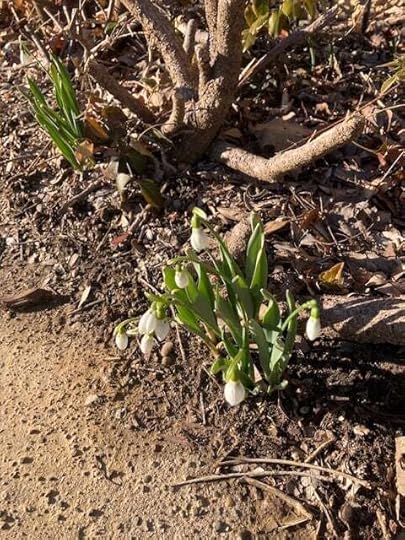 Spotted this snowdrop about to bloom on a stroll this weekend.
Spotted this snowdrop about to bloom on a stroll this weekend.The opposite of the treadmill is to immerse yourself in the present. To slow down and notice what’s around you. It’s savoring the act of writing itself and ignoring what happens after. It’s appreciating that writing this newsletter is as much about the process of figuring things out for myself as it is about how many people read it. The opposite of the treadmill is stillness…meditation…not moving at all. The opposite of the treadmill is knowing that you are enough right now, exactly as you are.
What treadmills are you on this week, friends?
Thanks as always for reading, sharing, commenting, liking! Last chance to sign up for the last winter writing workshop tomorrow—Feb. 22 from 7-8:30. We’re writing love, a fitting way to end. Get your tickets here.
Don’t make the mistake of thinking treadmills are productive or efficient. They’re not. The treadmill of production leads to irrationalities, like in the article here, where we over-produce milk which we then dump.2
“If you’re not growing, you’re dying,” right? Only, no, there are lots of states that are neither growing nor dying. The natural world doesn’t deal in infinite growth. Even whales only get so big. There are natural limits and we should pay attention to that lesson.3
You know you’re in an organization or group that’s obsessed with growth when they’re more concerned about potential students/clients/consumers/audiences than they are about their current students/clients/consumers/audiences. The people who have already showed up are never as important as the people who might show up, right?4
Of course, it’s a happy thing to publish a book. It does not make you happy, because it’s external, and happiness is an internal state. You have to make yourself happy. Doesn’t that suck?
February 6, 2022
Thinking about my one precious life
Hey, You Think Too Much fans! You Think Too Much is still alive, in a new format, at Substack. Check it out here and follow to get posts delivered to your inbox every Monday.
I’m not going to lie. My optimism has come close to reaching its breaking point this week. I’ve felt the numbness of despair creeping in.
I don’t despair about the virus itself. The virus is a thing of nature1 and it will do what it’s going to do, including fading away eventually because nothing in nature lasts forever, including us.2 What I despair about is the habits we’ve formed over these past two years.
Will be able to stop letting our lives be ruled by fear? Will we be able to have serious conversations about the important things we’ve sacrificed (like crucial years of our children’s socialization and education) and when it’s time to accept a certain amount of risk in order to stop damaging ourselves in other ways? Will we all be able to stop sounding so certain—certain we know what’s right while those people over there don’t? I don’t know.
Perhaps, as my friend suggested, this is the messy transition to the “after” we’re living in these weeks. But if so, the messiness feels like too much to bear.
I am close to despair, but I have not surrendered to it yet.
On Saturday, I went for a walk along the river and I listened to a podcast about wintering and how winters may be hard, but they don’t last forever and we cannot live our whole lives in the headiness of summer. Winter is an invitation to rest and regenerate. Nature understands the necessity of winter. So should we.
At the end of my walk, I ran into an older woman on the sidewalk. She was bundled up, a scarf pulled over her face. “Stephanie!” she smiled and said to me.
“No, not Stephanie,” I said.
“Oh, well, I see your face around town all the time and I thought I knew you.”
“I’m Robyn,” I said. “And now you do know me.”
This is how things go in Madison. We bump into each other and bump into each other until eventually we stop and introduce ourselves. It is too small a space to ignore people and this is a thing that gives me hope.
After my walk, I watched my Bengals win a playoff game for the first time in 31 years. And sports are certainly imperfect3, but they are also a source of great joy. After the Bengals won, I called my dad, who used to take me to games when we had season tickets, years and years of shivering in the cold and being the last people in the stands after we’d lost once again. Years and years of getting our hopes up only to have them crushed. And we’re not Chicago with the Cubs, but we, too, are joyful.
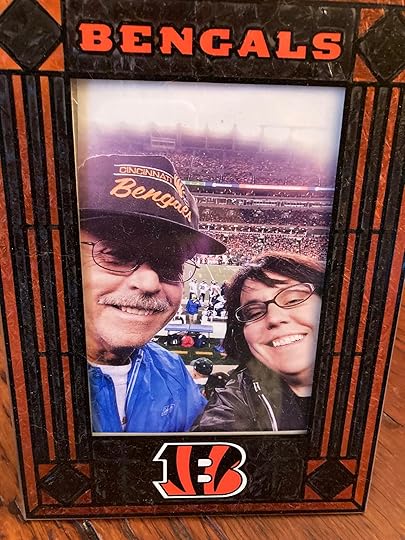 Me and Dad during the lean years
Me and Dad during the lean yearsThen Saturday night, my friends came over. We sat around the dining room table. We were a small group, but just the right number. We told stories and laughed and drank cocktails. We didn’t talk about covid because there’s nothing left to say. We gossiped and remembered the first time we met and told embarrassing stories about each other.
This is the cure for despair. Joy and togetherness. This is a truth I must remind myself of over and over. The pandemic may take many things from me, but not this.
“This is my one, small precious life,” I thought to myself as I went to bed that night. “And this is exactly how I want to spend it.”
November 21, 2021
You Think Too Much newsletter
Hey, You Think Too Much friends and followers! You might have noticed that I haven’t been posting here much lately. I’ve migrated most of my blog-style posts to my newsletter and you can check it out here. If you subscribe, you’ll get my newsletter delivered to your inbox every Monday, along with other posts as the mood hits me. It’s everything you liked about the blog, in a newsletter. Subscribe here to get tomorrow’s post, all about the opposite of the internet. And thanks, as always, for reading!

November 18, 2021
Thinking about witches
I’ve decided I want to be a witch.
It started with a book I read a few weeks back, one of those that goes on bouncing around inside my head long after I finished the last page. Cackle, by Rachel Harrison, is the story of Annie, who moves to a small town in upstate New York after her boyfriend dumps her. In Rowan, she meets Sophie, who’s beautiful, kind, talented and a little mysterious. Also, everyone else in town seems a little afraid of her.
You can probably guess where the book goes from there, given the title. Suffice to say that there are witches. I’ll come back to that.
 Cackle, by Rachel Harrison
Cackle, by Rachel HarrisonThe book made me think a lot about the nature of gender and femininity and friendships. Annie is ecstatic to have a friend, but Sophie is so amazing that seems too good to be true. Can Sophie really want to be friends with her? Can women really be friends like this? Does Sophie have some ulterior motive? Is it possible to find that much happiness just in friendship with another woman?
When I used to ask my students to describe one thing they didn’t like about their own gender, one of the most common answers among the women in the class was cattiness. “Girls are mean to each other,” they would say.
“Are they really?” I would challenge them. “Or is that just what the patriarchy wants you to believe?”
Then I would assign them Roxane Gay’s essay, “How to Be Friends With Another Woman.” That Gay felt that essay needed to be written suggests that the women in my classroom weren’t all wrong.
There’s nothing inherent in women that makes them catty, but women are taught to distrust other women and there’s nothing coincidental about that. The cishteteropatriarchy wants women—all types of women—to be isolated from each other. Black women from Asian women. City women from country women. Trans women from cis women. Keeping us apart works quite well for the powers that be.
So we all become a little bit like Annie in the novel, trying very hard to create a version of herself that pleases other people (and especially her ex-boyfriend), while being suspicious of the perfectly wonderful woman who appreciates her exactly as she is—Sophie. Sophie who is totally honest about who she is. Who doesn’t smile when she doesn’t feel like smiling. Who has gifts and talents and abilities that she isn’t ashamed of. A woman who is terrifying to the townspeople because women who are in full control of themselves are, in fact, terrifying.
The novel suggests that any woman can become a witch. Or maybe everyone? The details aren’t clear, but you become a witch when you surrender. You just surrender to the power that’s already inside you. And for weeks afterward, I wondered, yeah, what would that feel like? What would it feel like to fully surrender? To embrace my inner witch?
I think embracing my inner witch would mean giving so many fewer fucks about all the stupid things the world has worked very hard at convincing me I should give a fuck about. Every time I assert myself in my job in a way that isn’t all pink and sugar-coated, are people seeing me as a bitch? Nope, don’t give a fuck about that anymore. Is it too pushy and conceited to promote myself and my writing in the world? Oh, yeah, giving that up. Does this shirt make me look fat? Zero fucks given.
Sophie’s witchiness takes the form of living out in the woods by herself. I can see the attraction there. To be alone is a radical act for a woman. Still, I think I’d prefer to be a town witch, surrounded by cats. Sophie gardens and makes things and takes care of her community, even if they resent her for it. I can get behind all of that. She is a witch who shares her power with others. Who even after years of persecution (there’s a graveyard filled with the bodies of her witchy sisters), hasn’t given up on reaching out. Yeah, that’s a witch.
The world works so hard to convince all of us—not just women—that we are small and powerless and not good enough in all the ways. The power of being a witch is the power of refusing all of that. Of throwing your leg over our broomstick and letting all the fucks you no longer give trail in your wake like fire.
March 18, 2020
Madison: March 18, 2020
I wake up at six to the sound of cars on the street outside
our house, the early rush hour that is Madison. This feels like several
miracles. That I slept all the way through the night, managing to slip off the
weight of anxiety for a few hours. That some part of the world goes on, cars
moving from one place to another. People inside them.
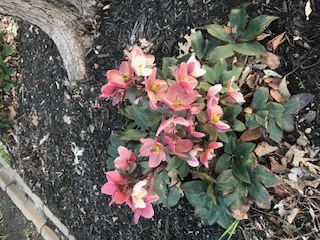
I brush my teeth and there’s toothpaste on the cap. I’d like
to wipe it off. Reach for the toilet paper. Stop. I use my fingers instead and
then wash them off.
What month is this anyway? Could my birthday have been two
weeks ago? The small party we had. The faces. The drinking. Just another
gathering then.
I have a Joan Shelley song in my head, The Fading. I saw her
play last week in town. “This might be the last show we play…” She trailed off,
uncertain how to end the sentence. None of us knew how to end the sentence.
I’m wearing a sweater that I bought at Target last winter. I
love the color and its soft, but the sleeves are big in a way that felt too
weird to wear in public. It doesn’t really matter now. It looks fine on a Zoom
screen. No one can see the sleeves. Whole parts of me have disappeared in this
new life.
Last night, I played euchre on an app with my parents and my
brother. My brother and I Zoomed, but my parents couldn’t figure it out—how to
get the app working. How to follow the link. We’d stopped playing euchre when
we got together over the last few years. Why did we stop? Now I miss the
heckling we used to do. “Think long, think wrong, Dad,” I say, but he can’t
hear me.

I go downstairs and open the door to let the cat out. I can
hear the sound of birds singing already, before the sun’s come up. The spring
chorus is coming. Spring is coming. Trees are blooming. My eyes itch. My throat
is scratchy and normally this would be a minor irritant. Allergies again. Now it
makes my stomach into a tight knot. “You will be okay, you will be okay, you
will be okay,” I whisper to myself. I’m one of the lucky ones.
Out the front window, I can see our neighbor’s big screen TV
glowing in the dark. When they first put it up last fall, we joked about how we
could look out our upstairs window and watch a movie with them. It was funny.
Now it’s comfort.
Some other day in this new life, I sat in an office with my
colleagues, talking about how we would go forward. About how we were coping. “It’s
so quiet,” one of them said. He had been in Rwanda during the genocide. “I walk
outside and it is so quiet and this is disturbing.” How much more terrifying
this all must be to him. To all the other people who carry their own traumas.
If I were teaching today. If I were getting in my car to go
to campus the way I normally would. If we were still in that world. If I were
going to sit down at a table in a room with twenty other people and talk about
life in all its complexities. If I were doing that act that even before this, I
am glad to say, even before this I saw that it was sacred. Even in that world,
sitting in a classroom together with my students was sacred and now we all know
it. Now so many have felt that loss.
If it were that day, that day from our other lives, I would
never be up this early and so I would have missed all these things. The song in
my head. The quiet sound of the heat running in the house. The toothpaste. The
birds. The neighbor’s TV. I would have missed it all and that is something, but
not enough. Still not enough.
March 29, 2019
Opening Day Delight
Obviously, for my daily essay on a delight, yesterday I wrote about Opening Day:
Opening Day! What a delight! The sun was shining. We opened
the windows. We ate peanuts and drank beer. Why isn’t Opening Day a national
holiday? So much better than so many others and is there a better religion than
baseball?
The Reds won and Yasiel Puig licked his bat several times (but did not get on base) and it came down to a 16-pitch at bat with the Pirates’ best hitter (Dickerson) against our veteran reliever (Hernandez). Foul ball after foul ball, with Jeff and I on the couch and Kevin the cat between us, my hand on her belly as if I could draw her calm up into me because it was tense.
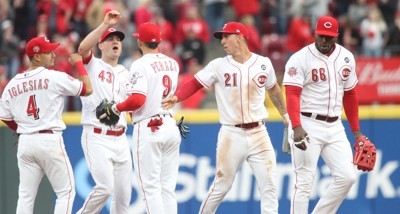
But isn’t that, after all, a pleasurable sort of tension? A
feeling of nervousness in your body that has no real consequences? Is that the
delight of watching sports? A roller coaster of sorts?
When the Reds took the field, I teared up. Our new manager,
a hometown guy. The familiar faces. The joy to be back. The sun. The green. The
blue of the sky. The windows open. We have survived. We made it. We lived to
see another season.
March 19, 2019
Madison Monday: Book Release
It’s been two weeks now since SHE/HE/THEY/ME was released.
Two weeks since the big party at Village Lights Bookstore (Thank you everyone who
came out to see me and talk and listen and bring me gin and tonic, etc. and to
Nathan, Anne, Sean and Chelsea at Village Lights for the amazing event!).
 Trophies from our trivia victories
Trophies from our trivia victoriesWriting a book and then seeing it go out into the universe
is a big thing. Sort of too big to cover in one blog post. I can’t tell you how
weird it still feels to type the phrase, ‘my book,’ like at any minute the
universe will sweep down and punish me for such hubris, even though it clearly
is my book. But here are a few thoughts about ‘my book.’
I don’t know what it would be like to be a writer who lives
in a different sort of place. There are probably advantages to living in New
York or a bigger city. Bigger writing community. Better connections.
But I don’t live in New York or a big city. I live in
Madison and as I said in my acknowledgements, I can’t imagine a better place to
be a writer. Here are some of my favorite Madison moments in the past two
weeks.
– On the day the book released, the guy who runs our
favorite local bar—the place where we are currently undefeated Monday night theme
trivia champions—came down to the bookstore and bought three copies of my book.
Three copies of a very weird book about gender! ‘They hang out in the bar a
lot,’ the guy told the bookstore owner. True. Perfect.
– At the book release, a friend asked, ‘So is there some
ticker you can watch to see how many books you’ve sold?’ No. No, there is not.
This is both good and bad. Good because there’s no way to obsessively check how
the book is doing. Bad because there’s no way to obsessively check how the book
is doing.
– Walking down the street a few days after the release, the
guy who runs the local music store waved me inside. We’ve bought one guitar, an
upright piano, an amp, an upright bass, a ukulele and a mandolin from the store.
We might have a musical instrument hoarding problem, but if you’re going to
hoard something, why not musical instruments? He waved me in because he wanted
me to sign his copy of ‘my book.’
– During the question and answer portion of the book release,
my daughter asked me about my tattoo. I got it the Saturday before the book
release. It’s a star on the inside of my left arm. It is a reminder that I did
this. I wrote a book. ‘My book.’ I did that. I’m the kind of person who finds
it hard to slow down and enjoy the good stuff. This tattoo is to help me do
just that. And a reminder to keep going. To add a new star for each new book.
– At the coffee shop, one of the baristas told me she’s
already completed two different gender journeys in the book.
– At a party, a friend told me her teenage daughter is
reading the book. She skips the parts about getting a job and stuff. I don’t
blame her. Jobs are boring. The book is written to a general audience. If I did
it right, you don’t need to know anything about gender at the start. You can begin
from zero. But I was hoping young people would read it. Teenagers, especially.
So to know that an actual teenager was reading it made me very happy.
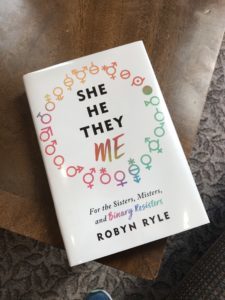
– I ordered a copy of ‘my book’ for the local library and when
it came, I held it in my hands before turning it back in so other people can
check it out. I love libraries. Most of the books I read come from the library.
I’m fairly affluent, but even I can’t afford to buy all the books I read, let
alone figure out where to put them afterward. To be able to look up your own
name in the local library system and see your book? That was its own delight.
Maybe these stories don’t add up to much. Here’s the thing.
When you send a book out into the world, it’s out there without you. Moving
through the universe. You can Google it. You can read the reviews (I’m
generally trying not to unless they’re clearly good ones). But everything’s
happening at a distance except for the small things you can actually
experience. The little stories. The small town stuff.
Maybe in New York, the guy at the local bar buys a copy of
your book when it comes out. I don’t know. I hope so, because it’s a pretty
cool thing.
March 15, 2019
Ross Gay’s Book of Delights
I’ve been reading Ross Gay’s new essay collection, A Book of Delights and I can’t recommend it enough. Gay decided to start writing a small essay about some delight every day for a year, starting on his birthday. This collection is the result.
Gay lives in Bloomington and teaches at IU, so of course, I
love trying to figure out which spots in Bloomington he’s talking about. Which
bakery? The one on the corner of the square where my dissertation writing group
used to meet up? One of my own favorite delights is reading stories and essays
that are set in familiar places. “Ah, yes, I’ve been there,” I say to myself
and feel like I am in a very exclusive club. Or that the author and I have
connected in a whole different way. This is part of what places do. We have
both been there and now we are linked together.
This book was such an amazing idea, I decided I wanted to
try it, too. So not only am I reading one essay per day, but then I’m writing
one of my own. I started a few days after my own birthday. My essays are not as
good as Gay’s. But I like what he says in the introduction about the practice
of delight. If you are looking for a delight every day, you get better at it.
Delights become easier to see. Your life becomes more delightful.
I try to pick a theme for every year in January (at least I
do when I remember). This year’s theme is joy. “How are you going to do that?”
a friend asked. I stumbled through an answer. Really I had no idea. I just felt
that after meditating daily for over two years, I had finally carved out enough
room to make joy more visible. But delight and joy are cousins, so this is how
I’m adding more joy to my year. I am seeking delight. I am marking it out, day
by day. Word by word. As a practice it is, well, delightful.
What I love about Gay’s essays so far (I’ve only read eight)
is how embodied they are. Delight is, after all, a bodily thing. Sometimes it
seems that joy and delight live in the realm of the abstract. Delight is a
babbling creek or a fluffy cloud or a flower growing out of a curb. They are
disembodied. And certainly, I guess some delights are. But they are all
filtered through our bodies.
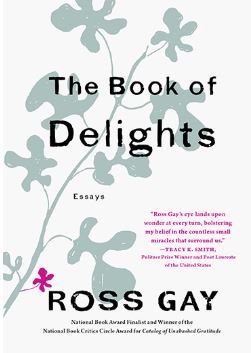
Gay does describe a flower growing out of a curb. But in
that essay, he also talks about his friend Don, who was murdered and who he
misses. He talks about sweating and touch. In other essays, he talks about
being black and a man and cisgender and tall. He moves through the world in a
specific body. His delights are specific. His delights are his. I find this
delightful. I am trying to think about what it means for my own delights. How
are my own delights deeply embodied?
Here’s an example. Gay writes about the delight of being
touched by strangers. A high-five. A waitress who puts her hand on her
shoulder. A garbage collector in Italy who slaps his bicep. He acknowledges
these are his delights, conditioned by the body he occupies. As a white,
ciswoman, I feel differently about the touch of strangers. I feel differently
about touch altogether.
On the other hand, I find Midwestern weather small talk
delightful. I didn’t when I was young. I thought talking about the weather was
so predictable and boring. But now I love it just because of that. When a
stranger on the street or in a store comments on the weather, it feels like a
kind of love and respect. My humanity and worthiness are affirmed every time an
old man says, “Nice to finally see the sun, isn’t it?” Yes. Yes, of course, it
is. It is delightful.
July 2, 2018
Madison Monday: Six Courses
Caprese-style bruschetta
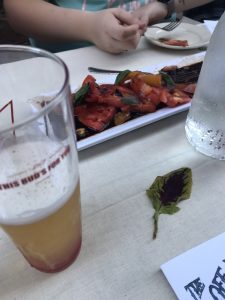
Whipped mozzarella-feta spread, Thomas Family winery baguette with Central State Table
Coming back from Paris wasn’t easy. As a friend said, you can leave Paris, but Paris never leaves you. I haven’t written much about going to Paris because I’m afraid to wrap words around it. It feels impossible. For a writer, that’s saying a lot. An experience that escapes language, or at least that you feel can’t quite be captured there. I understand now why there are a lot of songs about Paris.
Chopped summer salad

Roasted vegetables, oranges, goat cheese, IPA vinaigrette with Brew Dog Elvis Juice
Sometimes I tell myself that the Ohio isn’t really that different from the Seine. After I’d been back a couple of weeks, I was walking along the river in the morning. A young man was fishing on the shore. He caught up with me after he’d climbed up the bank with his pole. He was wearing shorts and a t-shirt with the sleeves cut off. He couldn’t have been older than twenty-five. “M’am,” he said. “M’am. Excuse me. Do you see that deer over there? Isn’t that cool?”
Carrot-ginger soup

Dark opal pesto with Blake’s Hard Cider Rainbow Seeker
I was in the bathroom at the airport in Paris and my skirt got stuck somehow, bunched up and exposing all my bits to the world, though I didn’t know. There was a French woman beside me at the sink. “Madame,” she said. Words in French followed which I didn’t understand, but her gesture was enough. “Merci,” I said. “Merci.” She was brisk and efficient. She didn’t insist on sharing a smile of embarrassment to ease my pain. She told me my skirt was bunched up and then she moved on. It felt very French and very kind and infinitely tender.
Skirt steak
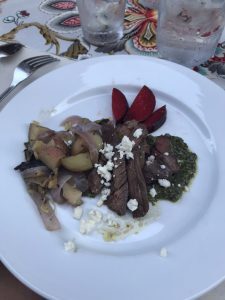
Charred vegetables, plums, feta, carrot-top pesto with Central State Still Not Sure
People in Madison do gather along the river, like they do along the Seine. They are more likely to be in their cars rather than sitting in small groups on the sidewalk or the grass. They are generally less likely to be drinking wine. And, yes, the food they bring to the river is much different, but everyone understands the appeal of water.
Mahi-mahi
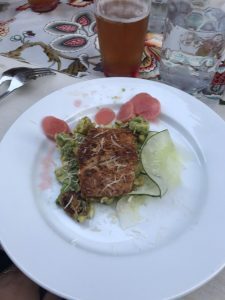
Blackened, lemon-garlic couscous, modern succotash with Against the Grain Citra Ass Down
On Saturday night, we went to the Harvest Dinner and Beer Pairing in the alley beside the Off Broadway Tap Room. We sat at a long table decorated with fern leaves and flowers. We were surrounded by good friends and people we’d just met. It was sweltering in the southern Indiana summer heat. The food was delicious. It was magic. Madison continues to surprise me like this. Just when I think I know all there is to know, something new appears. “I am still a mystery, too,” the town whispers.
Goat cheese cheesecake
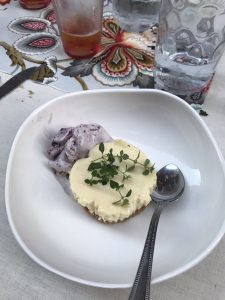
Lemon-thyme infused blueberry ice cream with New Day Craft Shelley Blue Ribbon
Coming home from Paris was hard. It was as if I’d glimpsed some other version of my life and for a moment, it seemed altogether better. It seemed like the life I should be leading. But maybe the physicists are right and in some other dimension, there is a version of me living that Parisian life. In Paris, we caught glimpses of each other like distant cousins. The Paris version wore better shoes and enjoyed the luxury of staring at people for longer than Americans can tolerate. She walked in beauty, but then, so do I. We both have our rivers. In Paris, I saw that other version of myself. And then I came home.
